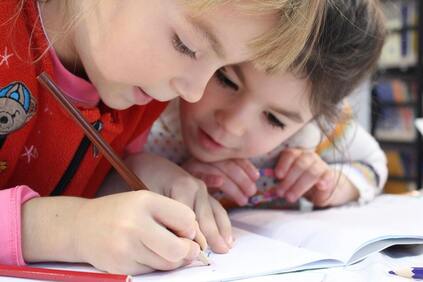 by Dorothy Lefford,OTR/L, VP Clinical Services, Easterseals Northeast Central Florida It’s back to school time again (post Hurricane Dorian), and getting back into routines can be quite a challenge for children...and parents! Tackling the return to school alone can be a monumental task, so Easterseals Northeast Central Florida is here to offer some help with that other monster: homework! Try these tips: • Identify homework/study zones • Establish regular study time in the daily routine • Keep distractions to a minimum • Help children make a plan or organize their assignments while supporting them in accomplishing their own work. A change in the day-to-day operations is a struggle for all of us, but presents an extra challenge to children with autism or other diagnoses that thrive off routine and knowing expectations. Here are some additional tips to help everyone be successful: • Make a "to-do" list. This helps keep homework sessions predictable. • Consider the child's sensory needs and strengths. How can you set up the environment for success? Accessible movement breaks? Adapted utensils? Open space vs. more defined space? • Consider reward charts. Always praise and reward your child for taking initiative and completing daily work. • Break up the assignments into smaller segments. This also gives you more opportunity to praise your child, offer a needed movement break or a chance to gain a reward to reinforce the completion of a task . Ask your teachers and or therapists about resources they can provide to you or direct you to for use at home particularly those which might carryover successes had at school. Always work closely with the classroom teachers; you have valuable insight into your child’s learning and they can learn from you too! Lastly, enlist siblings, friends and relatives to serve as mentors and tutors as needed. This helps generalize skills and encourages socialization, as well as gives mom and dad an occasional break. It takes a village to raise a child. Keep building your village! 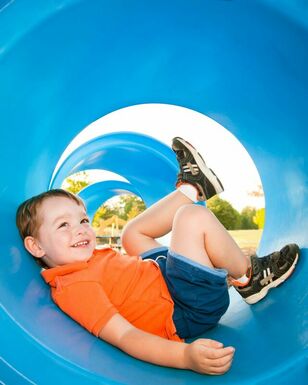 Easterseals Northeast Central Florida is offering free autism spectrum disorder (ASD) screenings for children ages 18 months to 17 years at its Daytona Beach location, 1219 Dunn Ave. Walk-ins are welcome weekdays from 9:30 a.m. - 4:30 p.m. Parents and guardians should allow 20-30 minutes for the screening once the appointment begins. More than 2 million Americans live with ASD, a neurological developmental disorder that impairs the ability to communicate and interact. With love and community support, they can live independent and productive lives. Each year, Easterseals Northeast Central Florida serves more than 500 children who have been diagnosed with ASD. The nonprofit agency also operates the Autism Center of Excellence – a one-stop center for diagnosis, interventions and case management for children who were referred by their physician for evaluation of ASD. To learn more about Easterseals’ autism services, visit http://www.easterseals.com/necfl/our-programs/. For questions about the free autism screenings, please call 386-944-7815 or email Davine Vincent at [email protected]. 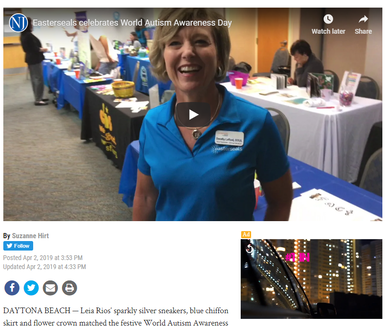 Our April 2 World Autism Awareness Day Celebration at Easterseals Northeast Central Florida was a big hit! Thank you to our autism providers and experts who participated in World Autism Day Celebration at Easterseals! Volusia County Schools, Florida Autism Center, Tobii Dynavox (assistive technology for communication), BASS Port Orange, Special Olympics Florida - Volusia County, Surfers for Autism, Barnes & Mcdonnell Pediatric Dentistry DDS, Special Needs Ability Program, Inc., Neural Balance, UCF CARD - Center for Autism and Related Disabilities, Adapt Behavioral Services, Volusia Flagler Family YMCA, Disability Solutions for Independent Living, Inc., WORC, Inc., The Little Gym, Hope Reins, Inc, and so many more. Such a wonderful day for support and advocacy! And, thank you to the Daytona Beach News Journal for covering our event and sharing the news of Easterseals with your readers. Read the story here. 3/12/2019 Easterseals Celebrates World Autism Awareness Day with Autism Resource Fair on April 2Read Now 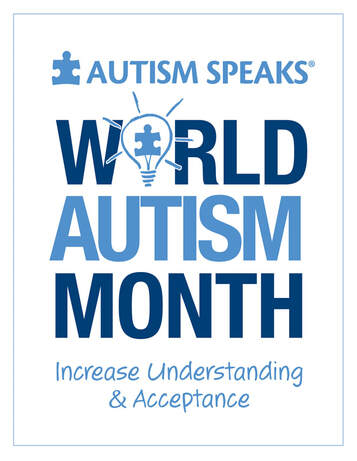 More than 2 million Americans live with autism spectrum disorder (ASD), a neurological developmental disorder that impairs the ability to communicate and interact. With love and community support, they can live independent and productive lives. Show your support by wearing blue and attending the Autism Resource Fair from 9 to 11 a.m. Monday, April 2, followed by educational workshops by local experts from 11 am to 1 pm, at Easterseals of Northeast Central Florida, 1219 Dunn Ave., Daytona Beach. The Autism Resource Fair coincides with World Autism Awareness Day, which also is April 2. The event will include autism-friendly events, educational activities and refreshments. Attendees can test their knowledge of autism, create awareness art, and learn more about autism spectrum disorder. Experts will be on hand from Easterseals’ Autism Center of Excellence, Volusia County Schools, Welcoming Hearts, doTERRA Wellness, Early Learning Coalition of Volusia & Flagler Counties, Tobii Dynavox (assistive technology for communication), Strategies, ADAPT, Special Olympics Volusia, The House Next Door, WORC, Beachside Music Therapy, Neural Balance, University of Central Florida Center for Autism and Related Disabilities (CARD) , Marcody Ranch, Disability Solutions, Brail and Talking Books Library, Blue Jay Academy, Chase Academy, City of Ormond, Hope Reigns and more. Each year, Easterseals of Northeast Central Florida serves more than 500 children who have been diagnosed with ASD. The nonprofit agency also operates the Autism Center of Excellence – a one-stop center for diagnosis, interventions and case management for children who were referred by their physician for evaluation of ASD. To learn more about Easterseals’ autism services, visit http://www.easterseals.com/necfl/our-programs/. For more information about the Autism Resource Fair or World Autism Day, contact Dorothy Lefford, OTL/R, Vice President – Clinical Services, at 386-944-7856 or [email protected].  Toys can be fun and educational for children with autism spectrum disorder. Here are a few winners we love! Toys can be fun and educational for children with autism spectrum disorder. Here are a few winners we love! It’s the most wonderful time! Twinkle lights are strung, cookies are baking, and holiday song are on repeat. It’s also time to shop for the prefect gifts for young and old. Often, special considerations can and should be made when gift-giving to children with autism spectrum disorder. What toys will stimulate without overwhelming? Which toys are simultaneously fun and educational? What toys can parents feel good about giving? Shoppers have many options, but they’re not all equal. So, we put together a list of some of the most popular educational, calming, and sensory gifts that children with autism spectrum disorder will enjoy…as will every young one on your list! For ages 0-4 Simple First Words: Let’s Talk (Priddy Books) By pressing the buttons and matchings the sounds to the pictures again and again, children will enjoy learning simple first words and developing their speech with this interactive book. Sound Puzzles (Melissa & Doug) Match the puzzle piece on the puzzle board and your child’s favorite pet will “speak” with a meow, woof, or tweet! With seven different themes, there’s bound to be one to match your child’s interests while encouraging problem-solving and independent play. Wiggly Giggly Ball Your child will be rewarded with a giggle every time they move or shake it! With bright colors and indentations to make grasping easier, the Wiggly Giggle Ball encourages gross motor movement while reinforcing cause-and-effect and hand-eye coordination. Your child will be rewarded with a giggle every time they move or shake it! With bright colors and indentations to make grasping easier, the Wiggly Giggle Ball encourages gross motor movement while reinforcing cause-and-effect and hand-eye coordination. For children ages 4-8 Jumpsmart Trampoline (Diggin Active) For kids who enjoy physical activity or need to work on their balance, an indoor trampoline is an excellent option. The Jumpsmart Trampoline’s fun learning games and silly songs will keep them active and learning all day long. LEGO® Blocks One of the most popular toys among children, LEGO® blocks not only encourage creativity and imagination, they assist in the development of fine motor skills, cognitive skills, and sensorimotor skills. LEGO® blocks are available in a variety of sizes appropriate for all developmental ranges. Give a Flip (Fun and Function) Stomp and catch! Physical play can help improve hand-eye coordination while working off excess energy. With Give a Flip, your child places a beanbag on one end, stomps their foot on the other end, and catches the beanbag in the air. This coordination game is perfect for encouraging visual tracking, motor planning, and persistence. For ages 8–12 Weighted Blanket Weighted items make great gifts. Whether you choose a weighted blanket or even a weighted stuffed animal, these items offer deep pressure therapy—helping calm down the nervous system and reducing anxiety. While they tend to be on the more expensive side, they are designed to hold up to years of use. (If choosing a weighted blanket, you’ll want to get one that is 10 percent of the child’s body weight, plus a pound or two.) Socially Speaking Board Game (Didax Educational Resources) Children with autism spectrum disorder can find it difficult to interact with others. Teaching basic skills like listening, greeting someone, and giving a compliment, this game provides a way to practice social interactions in a fun format. Glittering Vortex Lamp Similar to a traditional lava lamp, sparkly glitter swirls around as the lamp cycles through enchanting colors. This lamp is a soothing visual sensory tool for calming kids before transitions, for sensory breaks, or before bedtime. Want more ideas? Look at these guides from other notable autism organizations to help you choose the best gifts this season: https://www.autismparentingmagazine.com/best-autism-toys/ https://www.autismspeaks.org/news/ten-toys-children-autism https://www.momjunction.com/articles/best-toys-for-autistic-children_00400110/ https://www.nationalautismresources.com/gifts/this-weeks-top-toys-gifts/ 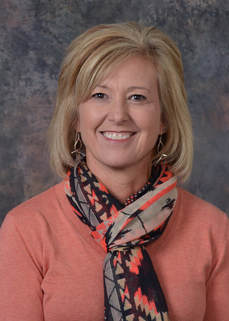 Dorothy Lefford, OTR/L, Vice President – Clinical Services Dorothy Lefford, OTR/L, Vice President – Clinical Services Autism spectrum disorders are the fastest growing developmental disabilities in the world today, affecting 1 in 59 children. Receiving the right support at the earliest stage of life can help a young person gain the skills they need to live, work and play to their highest potential. Early Intervention matters! We suggest three steps in helping parents and caregivers identify autism as early as possible. It starts with knowing what to look for. Dorothy Lefford, OTR/L, Vice President – Clinical Services at Easterseals of Northeast Central Florida, offers the following insight to help families navigate autism: Step 1: Learn about signs associated with autism spectrum disorder and corresponding ages. The timing and severity of autism’s first symptoms can vary widely. Some children with autism show hints of future problems within the first few months of life while, in others, symptoms may not become obvious until 24 months or later. Some children with autism appear to develop normally until around 18 to 24 months of age and then stop gaining new skills and/or start losing skills. Step 2: Identify specific red flags your child is exhibiting. The following red flags suggest a child is at risk for autism. Some children without autism have some of these symptoms, and not all children with autism show all of them. Thus, further evaluation is crucial. (If your child exhibits any of the following, please see Step 3: Get your child screened.) Possible signs of autism in babies and toddlers: • By 6 months, no social smiles or other warm, joyful expressions directed at people • By 6 months, limited or no eye contact • By 9 months, no sharing of vocal sounds, smiles or other nonverbal communication • By 12 months, no babbling • By 12 months, no use of gestures to communicate (e.g. pointing, reaching, waving etc.) • By 12 months, no response to name when called • By 16 months, no words • By 24 months, no meaningful, two-word phrases • Any loss of any previously acquired speech, babbling or social skills Possible signs of autism at any age: • Avoids eye contact and prefers to be alone • Struggles with understanding other people’s feelings • Remains nonverbal or has delayed language development • Repeats words or phrases over and over (echolalia) • Gets upset by minor changes in routine or surroundings • Has highly restricted interests • Performs repetitive behaviors such as flapping, rocking or spinning • Has unusual and often intense reactions to sounds, smells, tastes, textures, lights and/or colors Step 3: Get your child screened. Talk to your pediatrician about the red flags/signs you observe in your child. Autism screenings should be routinely done at a well care visit for your child at 18, 24 and 36 months. Ask your pediatrician for a free autism screening. Easterseals Autism Center of Excellence offers free autism screenings for children of all ages and walk-ins are welcome: 1219 Dunn Ave, Daytona Beach, FL 32114. Or, make an appointment by calling 386-944-7856. *** Autism is a lifelong challenge that affects individuals differently and in varying degrees. Easterseals Autism Center of Excellence ‘s early diagnostic and functional assessment clinic assists parents and physicians in obtaining a definitive diagnosis for children who exhibit warning signs and delays related to autism spectrum disorders. Individual treatment plans are developed and assistance with specialty interventions, respite and community resources are available. Contact Easterseals today and get started. We are here to help. Learn more about the Autism Center of Excellence online. 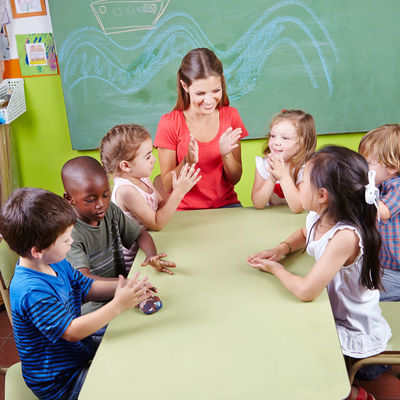 Easterseals of Northeast Central Florida recently announced that through early intervention and targeted education in collaboration with several community partners it has seen a significant reduction in the age of autism diagnosis in the children in our communities over the past 18 months. In July 2017, the average age of children diagnosed with Autism by Easterseals in Volusia and Flagler Counties was 7.9 years old. (The average age of diagnosis across the country is 4.8 years old). From July 1, 2017 through Aug. 31, 2018, due to a targeted effort toward parent and caregiver education, Easterseals Northeast Central Florida saw a decrease in the age of diagnosis to 5.87 years old. Children presenting for diagnosis ranged in age from 18 months - 18 years. Easterseals is the Help Me Grow Volusia-Flagler affiliate at United Way of Volusia-Flagler Counties, the agency to whom the data was reported. “Early identification and intervention of autism is crucial in order to maximize a child’s development and progress,” said Dorothy Lefford, OTR/L, VP Clinical Services at Easterseals of Northeast Central Florida. “Research shows early intervention makes a big difference to a child’s development leading to improved outcomes for children with autism, including higher intelligence, adaptive skills, and increased social and daily living skills.” “We are thrilled that our Help Me Grow Volusia-Flagler affiliate at United Way of Volusia-Flagler Counties was a part of the effort that helped reduce the age of detection for autism in Volusia county from 7.9 to 5.8 this year,” Help Me Grow Florida posted recently on its Facebook page, adding that “early detection and intervention are key in autism treatment.” The local leader in autism resources, Easterseals is teaching parents how to incorporate these research-based techniques into homelife and prioritizes educating parents and caregivers. Strategies that the highly recognized Easterseals’ Autism Center of Excellence employs include Autism Early Diagnostic and Functional Assessment Clinic, The PLAY Project (Play and Language for Autistic Youngsters), ASK: Autism Strategies Know-How behavior-modification educational clinics, TR-eat® Model (Transdisciplinary Effective Assessment and Treatment) behavior strategies for food aversion, free “ACT Now!” Autism Community Training events that offer CEU opportunities for staff and direct consultation with Easterseals’ autism experts, and more. Autism Center of Excellence in Daytona Beach and serves more than 500 children annually who have been diagnosed with autism. It’s premier local resource for diagnosis, interventions, resource and referral and case management for children who were referred by their physician for evaluation of autism spectrum disorder. To learn more about Easterseals’ autism services and its Autism Center of Excellence, visit its webpage or call (386) 944-7833. *** Easterseals of Northeast Central Florida serves more than 17,500 individuals and families with a range of disabilities to achieve their full potential. Easterseals of Northeast Central Florida serves the region with facilities in Daytona Beach, DeLand, Bunnell, and Leesburg. To learn more about Easterseals of Northeast Central Florida, please visit www.eastersealsnecfl.org or connect to our online community on Facebook. 9/13/2018 Parents, caregivers incorporate ASK strategies in caring for children with autismRead Now Need support in addressing challenging behaviors in children with autism? Just ASK. Easterseals’ Autism Center of Excellence’s Debbie Neller, OTL/R, is spearheading a program with parents and caregivers in which she provides behavior-modification tactics through ASK: Autism Strategies Know-How. The one-hour program is empowering parents by improving their understanding of autism and increasing their confidence in supporting children on the autism spectrum. Neller begins each session by explaining what autism is: A neurodevelopmental disorder characterized by difficulty with communication and socialization and often displayed with restricted interests and repetitive behaviors. According to statistics by Autism Speaks, autism occurs in 1 in 59 births and is 4-5 times more common in boys. Common challenging areas for children with autism usually include anything sensory related, such as feeding, toileting, speech and oral or physical hygiene. Throughout each training, Neller encourages parents and caregivers to be astute observers of their children, and to not be afraid to implement new tactics. She recommends five research-supported strategies:
Neller encourages parents and caregivers of children with autism to be patient with themselves and remain hopeful on their journey while she illustrates the many strategies they can employ. “I remind parents that their child is still the child they know and love and many methods exist to help their child in the most beneficial ways,” said Neller. “The ASK program helps adults understand the mind of a child with autism, while adding tools to the toolbox if and when they are needed.” “We want these children’s homes to be filled with enthusiasm and laughter,” said Neller. “Empowering parents to be more effective in how interact with their children is an important step toward that reality.” For more information about ASK or to schedule a presentation, contact Easterseals’ Autism Center of Excellence at 386-255-4568. |
Details
Archives
May 2024
Categories
All
|

 RSS Feed
RSS Feed